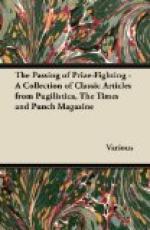“A little garden would be liked. At any rate there must be a view of trees, whether one’s own or somebody else’s.
“As regards position, the house must be in London. I mean really in London. I mean really in central London. The outlying portions of Kensington, such as Ealing, Hanwell and Uxbridge, are no good. Cricklewood, Highgate, New Barnet and similar places near Portman Square are useless. It must be in London—in the middle of London.
“Now we come to rather an important matter. Rent. It is up to you to say how much you want; but let me give you one word of warning. Don’t be absurd. You aren’t dealing now with one of those profiteers who remained (with honour) in his own country. And you can have our flat in exchange, if you like—well, it isn’t ours really, it’s the landlord’s, but we will introduce you to him without commission. Anyway, don’t be afraid of saying what you want; if it is absurd (and I expect it will be) we will tell you so. And if you must have a lump sum instead of an annual one, well, perhaps we could manage to borrow it (from you or somebody); but smaller annual lumps would be preferred.”
When I had written it out I handed it to Celia.
“There you are,” I said, “and, speaking as an artist, I don’t see how I can make it a word shorter.”
She read it carefully through.
“It does sound a jolly house,” she said wistfully. “Would it cost a lot as an advertisement?”
“About the first year’s rent. And even then nobody would take it seriously.”
“Oh, well, perhaps I’d better go and see another agent.” She fingered the advertisement regretfully. “It seems a pity to waste this,” she added with a smile.
But the artist in me was already quite resolved that it should not be wasted.
A.A.M.
* * * * *
[Illustration: Lady. “POOR DEAR! AND SO THEY REJECTED IT? IT’S A SHAME—THEY OUGHT TO SET YOU SIMPLER SUBJECTS.”]
* * * * *
A THREATENED SOURCE OF REVENUE.
The POSTMASTER-GENERAL and the CHANCELLOR OF THE EXCHEQUER are at this moment the most melancholy of men. For the last few months they had been quietly chuckling to themselves over one of the most brilliant ideas that ever adorned the annals of Government. But the best laid schemes gang aft agley.




